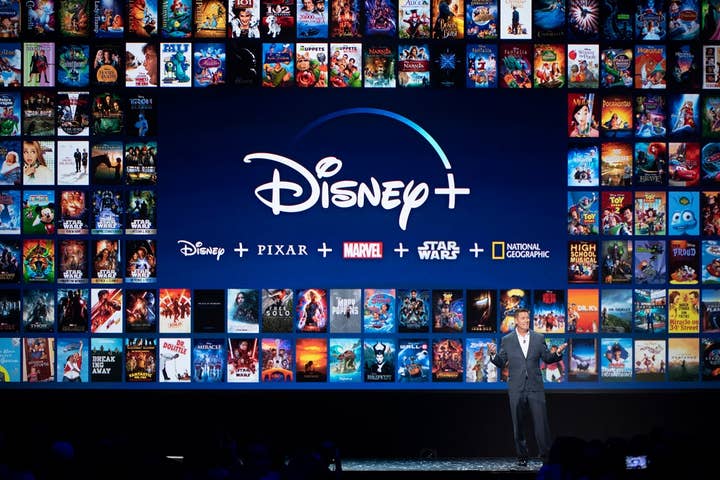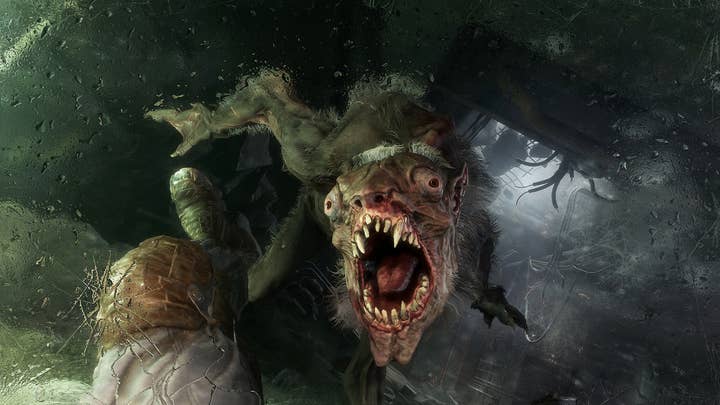Epic's exclusivity push leads to ugliness
2019 in Review: How consumer grumbling over Steam's newest competition snowballed into outright abuse
When companies are engaged in vigorous competition, consumers benefit. That's a pretty basic concept that usually goes unchallenged, but 2019 was not a usual year.
While an abundance of competition between video streaming services has helped spawn a new wave of prestige TV shows, you don't have to look very hard to find cord-cutters longing for the simpler days when streaming TV basically just meant Netflix. Now 70% of streaming customers think there are too many options, people are telling NPR they're "offended" about having to subscribe to so many services to get the shows they want, and USA Today is proclaiming the proliferation of services is "ruining TV."
They would instead prefer to go through one service, to pay one bill, to be secure in the knowledge that if their social circles start talking about some hot new series, it will be readily accessible to them without the need to juggle another subscription. In short, they want cable.
Meanwhile, Disney completed its long-in-the-works acquisition of 20th Century Fox, and the mainstream discussion was less about the harmful implications of having a single massive company dictating the creation and distribution of such a wide swath of global pop culture, and more about how the X-Men could be introduced into the Marvel Cinematic Universe, or which Fox characters could now be considered a Disney princess.

In many corners of entertainment, this year has been defined by a desire for consolidation, for the absence of competition and the triumph of convenience at all costs. People want what they want and woe betide anyone who would deny them that, no matter how understandable the motivations may be.
In gaming this year, that could be seen quite clearly in Epic Games' ongoing attempt to break Valve's virtual monopoly on PC game sales with Steam.
When the Epic Games Store was announced last December, its big competitive advantage seemed to be that it would offer developers an 88/12 revenue split compared to Steam's 70/30 split (which Valve amended just days before the Epic announcement so games that generated more than $10 million in revenue started to see a more favorable cut.)
However, when the Epic Games Store actually launched, the much more controversial part of its competitive strategy would come into play, as Supergiant Games' Hades, Dynamic Pixels' Hello Neighbor, and A44's Ashen were launched exclusively on the Epic Games Store. While that bit of news came and went with virtually no press coverage of a backlash, anyone paying attention to the Steam forums of Supergiant's previous game Pyre would see a foreboding preview of the year to come for many developers. There were people threatening to boycott devs who do exclusivity deals with Epic, complaints about the Epic Games Store's lack of feature parity, concerns about Epic's privacy policy and Chinese shareholders, and others who were just happy with Steam and didn't want to download another launcher.
And all that is more or less fine. Some of the Chinese shareholder complaints came with an unpleasant whiff of xenophobia, but for the most part, people had their reasons for being unhappy with the exclusivity, expressed themselves, and that was that.
Or rather, that was that until Epic came for the AAA exclusives. In January the company landed its first AAA "exclusive" in Ubisoft's The Division 2, with suggestions of more such exclusives from the publisher in the months to come. (It also released on Ubisoft's Uplay store, but just as when people talk about Steam having a monopoly, stores like Uplay and EA's Origin may as well not exist.) Comments sections on commercial sites filled up with a replay of the discussion on that Pyre forum thread, showing that a certain segment of the customer base passionately hated the idea, while another segment passionately thought that other segment's complaints were unjustified.

Then in February, Deep Silver announced that the anticipated Metro Exodus would be an Epic exclusive just two weeks before launch and everything hit the fan. The vocal contingent of upset players were further enflamed by Valve, which updated the store page for Metro Exodus with a note calling Koch's move "unfair to Steam customers, especially after a long pre-sale period." (Deep Silver was upfront that existing preorders on Steam would still be honored and the game and any add-ons would be fully supported on Valve's storefront.)
Making matters even worse, parent company THQ Nordic appeared to throw its subsidiary under the bus, saying on Twitter that the decision to go exclusive "was made entirely on Koch Media's side as Metro is their intellectual property," adding "we definitely want to have the players choose the platform of their liking and make our portfolio available to as many outlets as possible." The tweet was actually from the THQ Nordic label -- a sister operation without oversight over Koch -- rather than the THQ Nordic parent company, but there wasn't a clear distinction at the time, creating confusion that was one reason the company has since changed its name to Embracer Group.
With their public statements, Valve and THQ Nordic validated the anger some gamers were feeling, telling them they were justified in whatever offense they had taken to the move. Valve would later express some measure of regret about the way it handled the Metro Exodus news, with Steam's Nathaniel Blue saying the company's goal "is not to upset the community or light anyone's hair on fire." Also, Valve's statement is still on the Metro Exodus Steam page to this day, so it clearly isn't too remorseful about it.
After that, everything seemed to snowball. A frustrated Metro Exodus developer pointed out that future Metro games won't come to PC if this one doesn't sell any copies, and that generated more hate. The Kickstarted Phoenix Point went Epic exclusive despite having promised Steam keys to backers, and that generated more hate.
And just when you thought it couldn't possibly get any worse, Tim Sweeney was there to imply that upset gamers were too dumb to understand that what Epic was doing is for their own good. Granted, that's an uncharitable characterization of his comments, but if you're trying to mollify the angry mob, you can't expect them to come with a good faith reading for nuance and context.
Also not helpful? Running victory laps about how your admittedly unpopular exclusivity push is working really well. Understandable given Epic's need to establish its storefront as a viable option? Sure. But it's no good for pacifying unhappy players.
As the year dragged on, so too did a procession of Epic Games Store exclusivity announcements -- Shenmue III, The Outer Worlds, Ancestors: The Humankind Odyssey, Dauntless, Control, Quantic Dream's library -- and a procession of stories rooted in player backlash. Some developers even played to the concerns of aggrieved Steam fans, promising they wouldn't "sell our souls" to Epic or saying that they turned down an exclusivity deal because "it's a fair price to pay for establishing an ongoing trust between my studio and its customers."
Some Gearbox fans were upset when Borderlands 3 went Epic-exclusive, and expressed their anger by review bombing the Steam page for Borderlands 2. At the time, Gearbox CEO Randy Pitchford said the simple fact that Valve allows such tactics to thrive on its platform unchecked "makes me kind of happy about 2K's decision and makes me want to reconsider Gearbox Publishing's current posture on the platform." This was perhaps the happiest story out of this whole saga, as it actually prompted Valve to finally address review bombing campaigns on Steam.
As for the saddest story, that would probably be that of Glumberland, the two-person development team behind Ooblets. Glumberland's Ben Wasser announced the game's Epic exclusivity with a flippant post explaining their reasoning for taking the deal and talking about Epic exclusivity as "the latest thing Gamers™ have gotten angry about." It also used the forbidden word (it rhymes with "schmentitled") in reference to people who threatened to pirate the game because it's not on Steam.

So essentially any halfway competent PR flack who gave it a once-over could have pulled Glumberland aside and said, "You sure about this?" Presumably that never happened, as Wasser described in the original post, "We asked Epic if we could talk frankly about the situation and they were like whatever." That said, once Glumberland was drowning in thousands of hateful messages laden with anti-Semitism, homophobia, and racism, Epic took action, expressing support for the studio and denouncing the abuse it was subjected to.
"The announcement of Ooblets highlighted a disturbing trend which is growing and undermining healthy public discourse," Epic said in its statement, "and that's the coordinated and deliberate creation and promotion of false information, including fake screenshots, videos, and technical analysis, accompanied by harassment of partners, promotion of hateful themes, and intimidation of those with opposing views."
Days later, Wasser posted a Medium article about the experience, crediting Epic for its support since the blow-up and detailing some of the abuse they received. Wasser admitted he messed up from a PR point of view, but very pointedly refused to retract his comments or give the mob the apology it wanted.
"A portion of the gaming community is indeed horrendously toxic, entitled, immature, irrationally-angry, and prone to joining hate mobs over any inconsequential issue they can cook up," Wasser said. "That was proven again through this entire experience. It was never my intention to alienate or antagonize anyone in our community who does not fit that description, and I hope that you can see my tone and pointed comments were not directed at you."
If there's something the industry can take away from this year of exclusivity outrage, I'd like it to be a greater understanding of how the gaming press, publishers, and personalities can provoke this sort of hate mob, even unintentionally. Constant coverage of online outrage unrelated to anything newsworthy encourages people to behave poorly. Official statements distancing your company from controversies you're not already immersed in just tell people those controversies are valid things you would be horrified to be associated with.
Statements like the one Valve made, siding with the upset people and reassuring them that they've been wronged and are just in their anger, will likely stoke that anger. (I'm reluctant to suggest Valve was intentionally weaponizing its audience to punish one developer for taking an Epic exclusive and deter others from following suit, but the end result was the same.)
Maybe you look at this chain of events and place greater blame elsewhere. Epic repeatedly targeting crowdfunded titles that promised Steam keys and games that were already taking pre-orders on Valve's storefront certainly didn't help matters.
Or maybe you look at this -- particularly the sexist/racist/anti-Semitic abuse directed at the developer of a cute indie game when a AAA giant like Ubisoft seemed to skate by with relatively minimal pushback -- and you don't see angry consumers at all. Maybe you see a familiar assortment of opportunistic reactionaries finding another venue in which to assert their ownership of gaming culture using other people's conceivably legitimate concerns as a smokescreen for abuse. (Actually, it's about ethics in digital distribution storefronts...)
But whatever each of us might see in this, we all need to reflect on what we can do to prevent it from happening again, because what's gone on this year cannot be taken as normal. Exclusivity deals can be annoying and inconvenient, but there's no world in which they would justify the kind of abuse we've seen, or any abuse at all.
There's no acceptable escalation from the understandable grousing of that Steam forum thread of a year ago to the gleefully vile hate mob that came for Glumberland. It should worry us all that the games industry slid from one to the other so smoothly.
